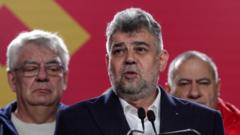In a major political upheaval, Romanian Prime Minister Marcel Ciolacu has stepped down after a right-wing nationalist secured a significant portion of the presidential vote. This unprecedented move has raised concerns about the future political stability of Romania and its role within the European Union.
Romania's Political Shake-up: PM Resignation After Nationalist Surge

Romania's Political Shake-up: PM Resignation After Nationalist Surge
Romanian Prime Minister Marcel Ciolacu announces his resignation following a strong showing by nationalist candidate George Simion in the presidential election.
Romania's political landscape has shifted dramatically following the resignation of Prime Minister Marcel Ciolacu, whose Social Democrat party has opted to exit their governing coalition. This decision came in light of nationalist candidate George Simion's impressive 40.9% performance in the first round of presidential elections held recently. Simion, known for his eurosceptic stance and "Romania First" agenda, is poised to face Bucharest's liberal mayor Nicușor Dan in a run-off scheduled for May 18.
Ciolacu's coalition had initially formed with the aim of securing a unified presidential candidate and maintaining a mutual parliamentary majority, but the recent election results prompted a reevaluation of their legitimacy. During an address to party colleagues, he cited the failure to achieve their goals as a rationale for resigning, declaring the coalition’s lack of legitimacy following the election outcome.
Simion's rise to prominence is notably fueled by public discontent over the annulment of presidential elections from the previous year, further complicated by accusations of Russian interference during the campaigns. Analysts have interpreted his victory as a strong rejection of the existing political structure, evidenced by significant support from Romanian citizens living abroad, particularly in countries like Spain and the UK.
In a climate of uncertainty, interim President Ilie Bolojan is expected to appoint a caretaker prime minister, but the looming 45 days of political instability following Ciolacu's resignation raises fears of a power vacuum in a moment when Romania urgently requires a stable leadership.
Critics of Ciolacu's leadership, including the Social Democrat mayor of Buzau, have expressed frustration over the party's decision-making, suggesting that recent choices contributed to this political embarrassment. The upcoming elections will not only determine the presidential direction but could redefine Romania's approach to broader European Union relations, as both Simion and Dan emerge as anti-establishment figures with starkly different visions for the country’s future.
As Romania braces for the potential consequences of Simion's electoral success, political analysts are divided on whether the anti-establishment fervor will manifest in a rejection of European alignment or inspire a constructive path towards democratic renewal. The upcoming weeks will be crucial in shaping Romania's domestic and international position as they navigate through this transformative period.
Ciolacu's coalition had initially formed with the aim of securing a unified presidential candidate and maintaining a mutual parliamentary majority, but the recent election results prompted a reevaluation of their legitimacy. During an address to party colleagues, he cited the failure to achieve their goals as a rationale for resigning, declaring the coalition’s lack of legitimacy following the election outcome.
Simion's rise to prominence is notably fueled by public discontent over the annulment of presidential elections from the previous year, further complicated by accusations of Russian interference during the campaigns. Analysts have interpreted his victory as a strong rejection of the existing political structure, evidenced by significant support from Romanian citizens living abroad, particularly in countries like Spain and the UK.
In a climate of uncertainty, interim President Ilie Bolojan is expected to appoint a caretaker prime minister, but the looming 45 days of political instability following Ciolacu's resignation raises fears of a power vacuum in a moment when Romania urgently requires a stable leadership.
Critics of Ciolacu's leadership, including the Social Democrat mayor of Buzau, have expressed frustration over the party's decision-making, suggesting that recent choices contributed to this political embarrassment. The upcoming elections will not only determine the presidential direction but could redefine Romania's approach to broader European Union relations, as both Simion and Dan emerge as anti-establishment figures with starkly different visions for the country’s future.
As Romania braces for the potential consequences of Simion's electoral success, political analysts are divided on whether the anti-establishment fervor will manifest in a rejection of European alignment or inspire a constructive path towards democratic renewal. The upcoming weeks will be crucial in shaping Romania's domestic and international position as they navigate through this transformative period.



















